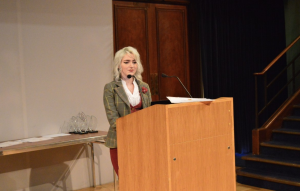For our first Women on Wednesdays this academic year, we’ve talked to Trinity Stenhouse, a third-year student on the MSci Physics with Theoretical Physics course. She’s also currently Vice-President (Activities) of the RCSU and is involved in the IC WNBiP committee!
Describe your path into physics, what kickstarted it?

I’ve always been interested in how things work, but I’ve also always had really broad interests. For me, physics was a way to understand how, fundamentally, everything works.
I was also really lucky to have a teacher at my high school who took me under his wing and taught me physics content well above A level. He saw that I was always bored and doodling in lessons so gave me a project to do investigating dynamical theories above the standard model that could explain the Higgs hierarchy problem. I got really invested in it and spent a lot of time researching theories. This helped me recognise my passion for research and establish that I would like to do a PhD one day in particle physics.
What have been the “highlights” of your time at Imperial so far?
Definitely meeting like-minded people is a highlight. I think it’s similar for a lot of us here that we’ve not always had friends on the same wavelength. I talk to my friends here and our conversations are littered with maths jokes and physics references, sometimes you’ll pick up bits of a language you didn’t previously know at all since it’s so multinational. It’s such a great work environment! Going home, it’s easy to forget that that’s not how everyone speaks and how lucky we are to have these kinds of conversations so frequently.
Being physics wellbeing rep has brought me a lot of joy here too. Organising the physics picnics, the university’s first in person event post pandemic, was one of my greatest achievements so far. Also lobbying for the RCSU to throw end of year events and then being part of organising them. This led Aparna, RCSU President, to suggest I run for an executive committee role. I ran for VP operations and thankfully won.
This past year in the role I’ve organised the Science Challenge, an international science communication competition for schoolchildren and Imperial students, working with Professor Lord Robert Winston. The challenge gave me the opportunity to speak at the Royal Institution and visit Parliament, both of which I will never forget.
What are your interests within Physics/what’s your UROP about?
My UROP is about detecting a coincidence of neutrinos and gravitational waves. The deep underground neutrino experiment (DUNE), hopefully finished by 2030, aims to give us a deeper insight into how the universe came to be, why there are matter/antimatter asymmetries and maybe give us clues about how the universe could end. My UROP is looking at neutrinos emitted from merger events such as Binary Neutron Star mergers and black hole mergers, and determining what energies we would see them at DUNE. If LIGO/Virgo sent out an alert that a gravitational wave was observed, we would then be able to look at the energies of neutrinos observed and try to establish an event profile using both datasets – a process known as multi-messenger astronomy. I’m currently working on a variety of simulations for the number of events observed at each energy from the merger’s spectrum. I’m really enjoying it and also really appreciate being invited to group meetings for the neutrino groups at Imperial and Queen Mary, and the DUNE collaboration meetings. This experience has made me even more certain I want to do a PhD after my degree!
During your journey, what has your experience been being a woman in Physics?
My mum was a very successful woman working in Geneva and London before she had me in her 40s, so I only ever had her as an example of what a woman should be like (a female role model(?)). Therefore I didn’t think there would be any difficulties in me studying a STEM subject and hoping to be successful.
At school, I was always the only girl doing physics and further maths and I was most often top of the class. Whenever I got anything wrong or got less than 90% I did notice that the boys would tease me more than each other and make jokes like ‘oh maybe she was on her period’, which were entirely inappropriate. I thought that when I entered a more professional environment at university it would be fine since there would be more girls in the subject too.
Unfortunately, my year still has a very male-biased gender ratio so although there are a lot more people to relate to, it’s not perfect. I still get occasional jokes about only getting things wrong because of female specific issues and men asking me how well I did in assignments with the sole purpose of ‘trying to prove men are smarter than women’. It’s better than it was because the other women in physics and myself all try to support each other, which is fantastic, but unfortunately not all the guys are as willing to treat us girls as equals.